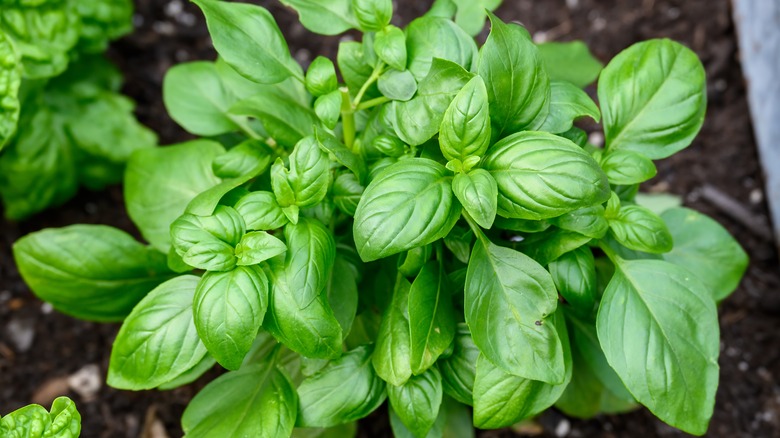Basil Should Always Be Hand-Torn For The Best Flavor. Here's Why
Hailing from the mint family, basil is known for its sweet flavors and underlying notes of anise and mint via MasterClass. But back in the day, basil wasn't just an innocent herb –- here's why.
On the one hand, there used to be negative connotations associated with basil, ranging from how it, apparently, summoned scorpions to how it was the symbol of hatred in the Victorian language of flowers per Herb Society. But on a positive note, basil also equates to best wishes, love, and protection. Washington College adds to the latter by mentioning that those in the afterlife were thought to be shielded by holy basil.
Of course, basil is also used for other aspects of life, especially when it comes to cooking. Cookist mentions that basil can be used to make pesto sauce, flavored salt, herbed butter, cocktails, and desserts (basil pairs especially well with strawberries, limes, and lemons). This also depends on the type of basil, though. For instance, Thai basil is best for phở, lime basil works beautifully in iced tea and fruit salads, and fino verde basil is great for Italian fare (via Gardening Know How).
But when it comes time to actually use the herb, Chef Carlotta Martinelli from Insider recommends hand-tearing it instead of chopping it for maximum flavor. Care to guess why?
Protect those essential oils
Basil leaves that have been sliced using the chiffonade method look quite elegant atop dishes, but unfortunately, this seems to release a lot of the herb's essential oils within, explains Chef Carlotta Martinelli to Insider. Courier & Press adds to this by explaining that knives tend to damage the cell walls, and all those precious enzymes start seeping out. Tearing basil leaves with your hands doesn't affect the cell walls as much, which seems to keep those flavors in and prevents off-putting colors and textures.
When using freshly torn basil leaves for dishes, Birds & Blooms insists that they should be incorporated when the dish is nearly done. That way, you'll get a boost of depth and fresh flavors. This is especially true when it comes to tomato sauce, explains Chef Martinelli. Any earlier and the basil leaves might become flavorless and lifeless via wilting.
So next time you work with basil leaves, be sure to tear 'em with your hands instead of using a knife. Doing so protects the color, texture, and essential oils of the leaves, which means maximum flavor for whatever dish you're whipping up.

